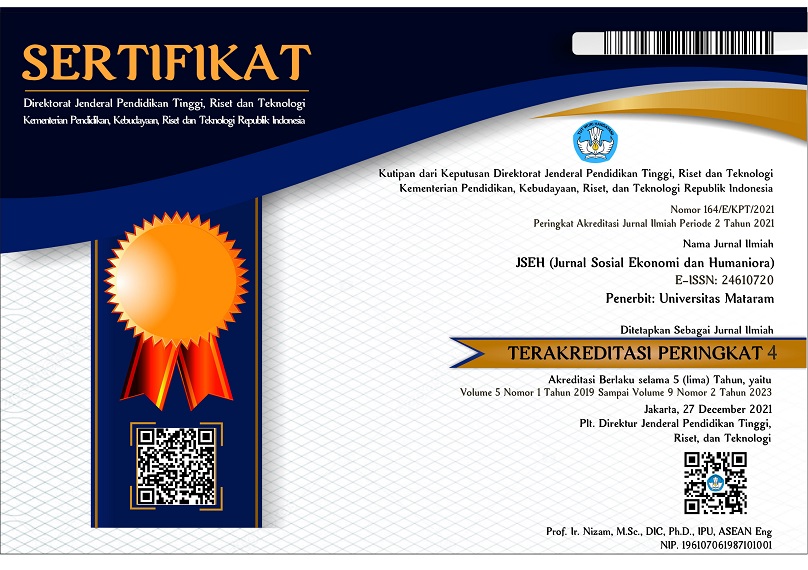Pengaruh Pengetahuan Multimedia Pembelajaran, Berpifikir Kritis terhadap Efektifitas Modul E-Learning Mahasiswa Fakultas Teknik UNM
DOI:
https://doi.org/10.29303/jseh.v10i4.709Keywords:
multimedia knowledge, critical thinking, e-learning moduleAbstract
This study is an Ex Post Facto study because the independent variables are not manipulated or subjected to specific treatments; instead, they are analyzed based on symptoms that appeared in respondents before the study's initiation. Adopting a cause-and-effect approach of "if x then y," this study does not involve direct control over the independent variables. Three variables are examined: two independent variables, Multimedia and Critical Thinking, and one dependent variable, the Effectiveness of the e-module. The relationship between the variables is analyzed using the correlation method, while the module's effectiveness is assessed through a quasi-experiment involving four control classes and four experimental classes. The study's results indicate that: (1) Multimedia and Critical Thinking collectively influence the Effectiveness of the E-learning Module, (2) Multimedia has a significant individual effect, whereas Critical Thinking has only a minimal impact, and (3) the Paired Samples t-test reveals an increase in learning outcomes, with an average difference of -13.92 between the Pre-Test and Post-Test. The regression analysis yielded a value of 71.314, categorizing it as effective. This e-learning module has demonstrated considerable effectiveness in enhancing understanding related to Multimedia.
References
Agustian. 2001. Rahasia sukses membangun kecerdasan emosional dan spiritual (ESQ).Jakarta: Arga Wijaya Persada.
Anita Woolfolk. (2004). Educational Psychology: Active Learning Edition. Boston: Pearson Education.
Arends, Richard I. (2007). Learning To Teach. New York: Mc Graw-Hill. Arhends, R. I. & Kilcher, A. (2010). Teaching for student learning: becoming an accomplished teacher. New York: Taylor & Francis Group.
Baharuddin dan Esa. (2007). Teori Belajar dan Pembelajaran. Yogyakarta: Ar- Ruzz Media.
Burnard, P., & Younker, B. A. (2004). Problem-Solving and Creativity: Insights from Students’ Individual Composing Pathways. International Journal of Education, 22(1), 59–76. doi.org/10.1177/0255761404042375
Cohen, R. J., & Swedlik M.E. (2005). Psychological testing and assessment: an introduction to test and measurement (6th ed.). New York. McGraw-Hill Companies.
Cruickshank, D.R., Jenkins, D.B. & Metcalf, K.K. (2006). The act of teaching (4thed.). New York: McGraw-Hill Companies. Inc.
Daniel Muijs & David Reynolds. (2005). Effective Teaching: Evidence and Practice. Thousand Oaks: SAGE Publications Ltd.
Danielson, C. (2002). Enhancing student achievement: a framework for school improvement. Beauregard St: Association for Supervision and Curriculum Development (ASCD)
Dimyati & Mudjiono. (2002). Belajar dan Pembelajaran. Jakarta: PT. Rineka Cipta.
Ebel, Robert L. & Frisbie, David A. (1986). Essentials of educational measurement. Englewood Cliffs, N.J.: Prentice-Hall.
Eckerd Academy. (2011). The problem-solving approach to behavior management [Versi Elektronik]. Diakses dari http://www.eckerdacademy. /family-resources/article-archive/the-problem-solving-approach-to-behavormanagement/. pada tanggal 12 Aguatus 2022
Efendi. 2005. Revolusi Kecerdasan Abad 21. Bandung: Alfabeta.
Fisher, A. (2008). Critikal Thinking An Introduction.Erlangga.
Fraenkel, Jack R. & Wallen, Norman E. (2006). How to Design and EvaluateResearch in Education. New York: McGraw Hill
Frederick G. Brown. (1970). Principles of Educational and Psychological Testing. Boston: Thomson Learning.
Goleman. 2000. Emotional Intelligenci. Jakarta: PT.Gramedia Pustaka Utama.
Hamdani. (2011). Strategi Belajar Mengajar. Bandung: PustakaSetia.
Hamdayana. J., (2016). Metodologi Pengajaran. Jakarta: PT Bumi Angkasa
https://journal.unismuh.ac.id/index.php/jrpd/article/download/7864/5178 , diakses 20 Agustus 2024
https://etheses.iainkediri.ac.id/9955/3/932303019_bab2.pdf, diakses 24 Agustus 2024
https://jurnalilmiahcitrabakti.ac.id/jil/index.php/jcp/article/download/1914/623, diakses 24 Agustus 2024
https://osf.io/v7g2k/download, KEMAMPUAN BERPIKIR KRITIS MATEMATIS, diakses 28 Agustus 2024
https://www.academia.edu/download/51806316/1046-1019-1-PB.pdf, Berpikir kritis dan berpikir kreatif sebagai fokus pembelajaran matematika, diakses 28 Agustus 2024
https://scholar.google.co.id/scholar?hl=id&as_sdt=0%2C5&q=berpikir+kritis&btnG=#:~:text=Berpikir%20Kritis%3A%20kemampuan%20berpikir%20tingkat%20tinggi%20yang%20dapat , diakses 28Agustus 2024
http://library.stik-ptik.ac.id/detail?id=4426&lokasi=lokal Menguak rahasia berpikir kritis dan kreatif , diakses 28 Agustus 2024
http://download.garuda.kemdikbud.go.id/article.php?article=1640882&val=14364&title=Analisis%20Tingkat%20Keterampilan%20Berpikir%20Kritis%20Siswa%20SMA , diakses 28 Agustus 2024
https://www.google.com/books?hl=id&lr=&id=1dMeEAAAQBAJ&oi=fnd&pg=PA45&dq=E-MODUL&ots=jSGXn9DoTK&sig=30L5T713Pf8jpQXwNs89xviU4_w Dinamika penyusunan e-modul, diakses 28 Agustus 2024
https://proceedings.radenfatah.ac.id/index.php/semnaspbio/article/view/676 Pengembangan Media Pembelajaran Modul Elektronik (E-Modul), diakses 28 Agustus 2024
https://scholar.google.co.id/scholar?hl=id&as_sdt=0%2C5&q=E-MODUL&btnG=#:~:text=Penggunaan%20e%2Dmodul%20dengan%20sistem%20project%20based%20learning Penggunaan e-modul dengan sistem project-based learning , diakses 28 Agustus 2024
https://scholar.google.co.id/scholar?hl=id&as_sdt=0%2C5&q=E-MODUL&btnG=#:~:text=Pengaruh%20penggunaan%20e%2Dmodul%20interaktif%20terhadap%20hasil%20belajar%20mahasiswa%20pada%20materi%20kesehatan%20dan%20keselamatan%20kerja Pengaruh penggunaan e-modul interaktif terhadap hasil belajar mahasiswa pada materi kesehatan dan keselamatan kerja, diakses 28 Agustus 2024
https://scholar.google.co.id/scholar?hl=id&as_sdt=0%2C5&q=E-MODUL&btnG=#:~:text=%5BPERNYATAAN%5D%20Pengembangan%20e%2Dmodul%20mata%20kuliah%20strategi%20 pembelajaran Pengembangan e-modul mata kuliah strategi pembelajaran , diakses 28 Agustus 2024
https://scholar.google.co.id/scholar?hl=id&as_sdt=0%2C5&q=E-MODUL&btnG=#:~:text=Efektivitas%20pengembangan%20e%2Dmodul%20project%20based%20learning%20pada%20mata%20pelajaran%20instalasi%20motor%20listrik Efektivitas pengembangan e-modul project-based learning pada mata pelajaran instalasi motor listrik, diakses 28 Agustus 2024
https://ejournal.unp.ac.id/index.php/jppf/article/view/107439 Analisis landasan ilmu pengetahuan dan teknologi pendidikan dalam pengembangan multimedia interaktif , diakses 28 Agustus 2024
Iskandar, H. (2014). Pengembangan Media Pembelajaran Animasi Mekanisme Katup pada Mata Pelajaran Pemeliharaan Mesin Berkendaraan Ringan.Vol.2No.1,78–89
Johnson, D.W., & Johnson, R.T. (2002). Meaningful Assessment Managable andCooperative Process. Boston, Massachussets: Allyn & Bacon.
Killen, R. (2009). Effective teaching strategies: lessons from research and practice (5th ed.). South Melbourne: Cengage Learning Australia.
Laurillard, Diana. (2002). Rethinking University Teaching: A Conversational Framework for the Effective Use of Learning Technologies. Oxford: Psychology Press
Lloyd, M., & Bahr, N. (2010). Thinking Critically about Critical Thinking in Higher Education. International Journal for the Scholarship of Teaching and Learning, 4(2). eric.ed.gov/?id=EJI1136134
Made Wena. (2009). Strategi Pembelajaran Inovatif Kontemporer: Suatu Tinjauan Konseptual Operasional. Jakarta: Bumi Aksara
Riduwan. (2010). Belajar Mudah Penelitian untuk Guru, Karyawan, dan Peneiti Pemula. Bandung: Alfabeta.
Sohibi, M., & Siswanto, J. (2012). Pengaruh Pembelajaran Berbasis Masalah Dan Inkuiri Terbimbing Terhadap Kemampuan Berpikir Kritis Dan Kreatif Siswa. Jurnal Penelitian Pembelajaran Fisika, 3(2), 135–144
Suarsana, I. M., & Mahayukti, G. A. (2013). Pengembangan E-Modul Berorientasi Pemecahan Masalah Untuk Meningkatkan Keterampilan Berpikir Kritis Mahasiswa. JPI (Jurnal Pendidikan Indonesia), 2(2). https://doi.org/10.23887/jpiundiksha.v2i2.2171, diakses 28 aguatus 2024
Sugiyono. (2011). Metode Penelitian Pendidikan (Pendekatan Kuantitatif, Kualitatif, danR&D). Alfabeta.
Suyanti, R. D., & Sianturi, K. M. (2017). Analisis Ketrampilan Generik Kimia Melalui Penerapan Model Strategi Pembelajaran Peningkatan Kemam-puan Berpikir (SPPKB) dengan media exe learning pada redoks).
Suyoso, S., & Nurohman, S. (2014). Pengembangan Modul Elektronik Berbasis Web Sebagai Media Pembelajaran Fisika. Jurnal Kependidikan: Penelitian Inovasi Pembelajaran,44(1). PubMed Central. https://www.ncbi.nlm.nih.gov/pmc/articles/PMC3894304
Downloads
Published
How to Cite
Issue
Section
License
Copyright (c) 2024 Nurlaela Latif, Ady Rukma

This work is licensed under a Creative Commons Attribution-NonCommercial 4.0 International License.







